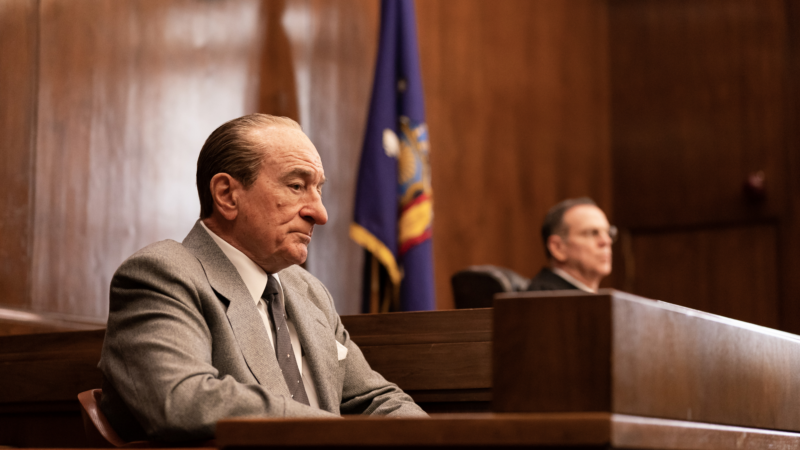‘The Alto Knights’ is a mob drama with a double dose of De Niro and … not much else
It’s been 10 years since Barry Levinson directed a new feature, and if that seems like a long wait, I should note that it’s taken 50 years for The Alto Knights, his new movie, to make it to the big screen.
The idea was first pitched in the 1970s, not long after the New York City crime lord Frank Costello, known as “the prime minister of the underworld,” died at the age of 82. But the film languished in development hell for decades and only got the green light a few years ago, presumably on the strength of a major casting gimmick: Both Costello and his notorious friend-turned-rival, Vito Genovese, are played by the same actor, Robert De Niro.
That’s one way to liven up the formula, I suppose. De Niro has played many mobsters, in The Godfather: Part II, The Untouchables, Goodfellas and The Irishman, for starters. He’s riffing on a lot of those characters in The Alto Knights, which often plays like a hectic rehash of mob-drama clichés. That’s not entirely the movie’s fault; the real-life events it’s tackling here are why some of those clichés exist. Frank Costello was the inspiration for The Godfather himself, Don Vito Corleone.
The Alto Knights begins with a bang in 1957: Frank, the big boss of the Luciano crime family, is shot in the lobby of his New York apartment building. Frank survives and knows immediately that it was Vito who ordered the hit, but he keeps this a secret; he isn’t interested in revenge, and he doesn’t want to start a mob war.
From there, the story flashes back about 50 years, recounting in rapid-fire fashion how young Frank and Vito befriended each other in New York, where they hung out at the Alto Knights Social Club, a hive of gangster activity. Both men became bootleggers during Prohibition, rising through the ranks of the Luciano family; Vito became boss, but fled to Italy to avoid a murder rap. By the time Vito returned, years later, after World War II, Frank was in charge of a prosperous criminal empire, protected by paid-off cops and politicians.
Most of this backstory passes by in a barely coherent rush, which is a shame. Given his knack for dramas about immigrant experiences and boyhood friendships in films like Diner, Avalon and Liberty Heights, Levinson could have teased out something rich from Frank and Vito’s early years. But The Alto Knights, which was written by Goodfellas screenwriter Nicholas Pileggi, is eager to race ahead to the tug-of-war between De Niro and De Niro. Vito, who’s violent and irrationally jealous, wants to seize back control of the outfit and turn it into a drug-dealing operation. Frank is trying to cultivate a legitimate, respectable image and tries to talk Vito out of it.
I’m not sure exactly what the movie gains from having one actor play both roles, unless it’s trying to suggest that Frank and Vito are two sides of the same corrupt coin. Whatever the case, De Niro is clearly at home with this gangland material, and it’s fun to watch him argue with himself.
As Vito, De Niro seems to be channeling Joe Pesci’s hothead from Goodfellas, barking and cursing under a layer of prosthetic pancake. As Frank, he smiles, shrugs, and plays it cool. Frank doesn’t want any trouble; he just wants to rake in the dough, hobnob with philanthropists and politicians, and spend his nights at home watching TV with his wife, played by a frowny Debra Messing. They have a loving, stable marriage, unlike Vito and his fiery wife, Anna, played by a very good Kathrine Narducci.
The Alto Knights doesn’t have many more ideas than this good-mobster/bad-mobster dynamic. The script does pull together a lot of events from the 1950s, including a Senate investigation into interstate crimes and a historic summit that brought together hundreds of mob bosses from around the country. But the movie doesn’t seem to trust its own story. Barely a scene goes by that isn’t embellished with popping flashbulbs and giant newspaper headlines, as if Levinson were trying to convince us that we were watching history in the making.
Still, De Niro’s performances do keep you watching — or, at least, one of them does. Vito may be little more than a walking tantrum, but Frank makes for good company, especially in those moments, toward the end, when he seriously considers bowing to Vito and stepping aside. So what if De Niro is playing a sentimentalized version of a ruthless crook? Hollywood gangster movies — even the ones as dubious and derivative as this one — have always known a thing or two about selling us a beautiful lie.
From chess to a medical mystery: Great global reads from 2025 you may have missed
We published hundreds of stories on global health and development each year. Some are ... alas ... a bit underappreciated by readers. We've asked our staff for their favorite overlooked posts of 2025.
The U.S. offers Ukraine a 15-year security guarantee for now, Zelenskyy says
Ukrainian President Volodymyr Zelenskyy said Monday the United States is offering his country security guarantees for a period of 15 years as part of a proposed peace plan.
Genre fiction and female authors top U.S. libraries’ most-borrowed lists in 2025
All of the top 10 books borrowed through the public library app Libby were written by women. And Kristin Hannah's The Women was the top checkout in many library systems around the country.
Teens are having disturbing interactions with chatbots. Here’s how to lower the risks
Teen use of AI chat bots is growing, and psychologists worry it's affecting their social development and mental health. Here's what parents should know to help kids use the technology safely.
Why do so many people ring in the new year on Jan. 1?
Much of the world follows the Gregorian calendar, named after Pope Gregory XIII, who put the finishing touches on a Roman system that integrated ideas from other cultures.
A ‘very aesthetic person,’ President Trump says being a builder is his second job
President Trump was a builder before he took office, but he has continued it as a hobby in the White House.







